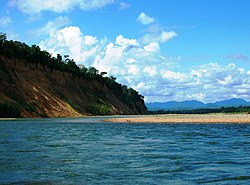La Paz Department (Bolivia)
| Department of La Paz | |||
|---|---|---|---|
| Department | |||

|
|||
|
|||
 Location within Bolivia |
|||
 Provinces of the La Paz Department |
|||
| Country |
|
||
| Capital | Nuestra Señora de La Paz | ||
| Government | |||
| • Prefect | Pablo Ramos Sánchez | ||
| Area | |||
| • Total | 133,985 km2 (51,732 sq mi) | ||
| Population (2012) | |||
| • Total | 2,706,359 | ||
| • Density | 20/km2 (52/sq mi) | ||
| Time zone | BOT (UTC-4) | ||
| HDI (2004) | - | ||
| Website | www |
||
The La Paz Department of Bolivia comprises 133,985 square kilometres (51,732 sq mi) with a 2012 census population of 2,706,359 inhabitants. It is situated at the western border of Bolivia, sharing Lake Titicaca with Peru. It contains the mighty Cordillera Real that reaches altitudes of 6.6 kilometers (4.1 mi). Northeast of the Cordillera Real are the Yungas, the steep eastern slopes of the Andes that make the transition to the Amazon basin. The capital of the department is the city of La Paz and is the administrative city and seat of government of Bolivia.
The Department of La Paz is divided into 20 provinces (provincias) which are further subdivided into 85 municipalities (municipios) and - on the fourth level - into cantons.
The provinces with their capitals are:
The chief executive office of Bolivia's departments (since May 2010) is the governor; until then, the office was called the prefect, and until 2006 the prefect was appointed by the President of Bolivia. The current governor, César Cocarico of the Movement for Socialism – Political Instrument for the Sovereignty of the Peoples was elected on 4 April 2010 and took office 30 May.
Under the 2009 Constitution, Bolivian departments have an elected legislature, the Departmental Legislative Assembly. The La Paz Assembly has 45 members including five indigenous minority representatives.
The most recent election results are as follows:
The languages spoken in the department are mainly Spanish, Aymara, Quechua and Guaraní. The following table shows the number of people belonging to the recognized group of speakers.
...
Wikipedia


